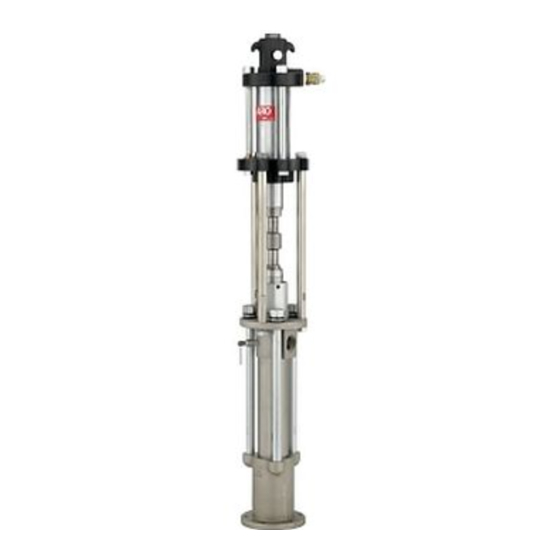ARO CHOP-CHECK 650941-X-C 운영자 매뉴얼 - 페이지 2
{카테고리_이름} ARO CHOP-CHECK 650941-X-C에 대한 운영자 매뉴얼을 온라인으로 검색하거나 PDF를 다운로드하세요. ARO CHOP-CHECK 650941-X-C 2 페이지. Chop-check pump series

650941 - X X E - C
PACKING MATERIAL
GENERAL DESCRIPTION
WARNING HAZARDOUS PRESSURE. Do not exceed maxi-
mum operating pressure of 2670 p.s.i. (184.1 bar) at 2000 p.s.i.
(137.9 bar) inlet hydraulic pressure.
PUMP RATIO X
INLET PRESSURE TO PUMP MOTOR
Pump ratio is an expression of the relationship between the pump motor area and the
lower pump end area. EXAMPLE: When 90 p.s.i. (6.2 bar) inlet pressure is supplied to
the motor of a 5:1 ratio pump it will develop a maximum of 450 p.s.i. (31.0 bar) fluid pres-
sure (at no flow) − as the fluid control is opened, the flow rate will increase as the motor
cycle rate increases to keep up with the demand.
WARNING Refer to general information sheet for additional
safety precautions and important information.
•
The chop-check pumps are primarily designed for the pumping of
heavy viscous material with or without fibrous content. The models
can be used with a gravity feed single post lift as a topper type as-
sembly or with a two post lift as a force feed type assembly. The low-
er pump is designed for easy priming and the double acting feature
is standard in all ARO industrial pumps. Material is delivered to the
pump discharge outlet on both the up and down stroke.
•
The motor is connected to the lower pump end by a spacer section.
This allows for lubrication of the upper packing gland and prevents
motor contamination because of normal wear and eventual leakage
through the material packing gland. Be sure the solvent cup is ade-
quately filled with lubricant to protect the upper packings and insure
longest service life.
TROUBLE SHOOTING
Pump problems can occur in either the hydraulic motor section or the
lower pump end section. Use these basic guidelines to help determine
which section is affected.
If the pump will not cycle.
•
Be certain to first check for non-pump problems including kinked, re-
strictive or plugged inlet / outlet hose or dispensing device. Depres-
surize the pump system and clean out any obstructions in the inlet /
outlet material lines.
•
Refer to the motor manual for trouble shooting if the pump does not
cycle and / or hydraulic fluid leaks from the hydraulic motor.
If the pump cycles but does not deliver material.
•
Refer to the lower pump end manual for further trouble shooting.
Page 2 of 2
PUMP OPTION DESCRIPTION CHART
PLUNGER TYPE
SPRING ARRANGEMENT
MAXIMUM PUMP
=
FLUID PRESSURE
PACKING MATERIAL
(packings are upper and lower unless noted)
Glass filled PTFE
3
C UHMW-PE
F UHMW-PE / Leather staggered (upper) / UHMW-PE (lower)
J Polyurethane (upper) / UHMW-PE (lower)
PTFE
P UHMW-PE /
staggered (upper) / UHMW-PE (lower)
PTFE
R
/ UHMW-PE staggered (upper) /
SPRING ARRANGEMENT
3 No spring
4 Multiple wave spring
PLUNGER TYPE
E Carbon steel with hard chrome plating
PUMP CONNECTION − UPPER / LOWER
NOTE: All threads are right hand.
1. Lay the pump assembly on a workbench.
2. Remove the top three (Y6-130-C) cap screws and (Y14-750-K) lock-
washers from the three spacer rods (figure 1).
3. Pull the hydraulic motor from the lower pump end until motor piston
rod is in the down" position and lower pump end rod is in up" posi-
tion.
4. Using e-ring pliers, slide the e" ring up far enough to allow the
sleeve to move upward and release the two connectors (figure 2).
PUMP CONNECTOR DETAIL
REASSEMBLY
1. Align the pump motor with the lower pump end. Position the hydrau-
lic inlet 95_ from the material outlet.
2. Install the two connectors and retain with the sleeve, slide the e"
ring back into position.
3. Reinstall the spacer rods to the pump motor.
4. Bring the motor and lower pump together and retain with the three
(Y14-750-K) lockwashers and (Y6-130-C) cap screws.
Glass filled PTFE
(lower)
Pump Motor Piston Rod
Piston Rod Adapter
E" Ring 95069
Connector 94688 (2)
Sleeve 94689
Lower Pump Piston Rod
Figure 2
PN 97999-877
650941-X-C
